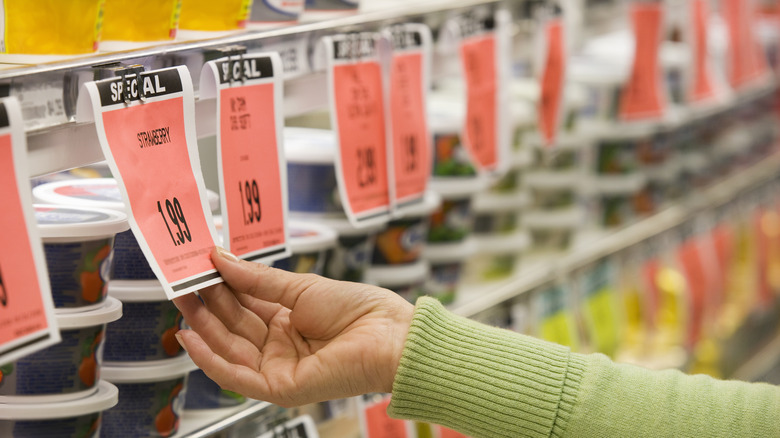New Report Says Aldi Is Attracting More Wealthy Shoppers Than Ever
Affordable stores like Aldi have long been lauded by bargain seekers (and those who prefer generic cereal over name-brand) for their low prices. Over time (and coinciding with inflation), more and more middle-class shoppers have found themselves looking to these retailers for deeper discounts. Now, an unexpected change is underway. According to a report by The Wall Street Journal, even the most wealthy of the U.S. population have begun regularly shopping at discount stores. From Dollar General to Ollie's to, yes, Aldi, one-percenters are ditching expensive supermarkets and changing how they buy their groceries.
This is a leap that could mean that the stigma of shopping at bargain outlets is falling away. While in the past, wealthier segments of the population might have seen lower prices as implying lower quality, that sentiment is seemingly being turned on its head. After all, as high corporate earner Morgan Pierce stated simply to The Wall Street Journal, "A carrot is a carrot is a carrot." Pierce earns roughly $200,000 annually and recently started shopping at discount stores like Aldi for groceries. For reference, the national average salary for most Americans is approximately $60,000.
One-percenters like Pierce are slowly beginning to ask an essential question: Why spend triple the amount on something at one store when you can pay less for the same item at Aldi? The idea is simple. So what exactly is spurring this change now?
Why the sudden switch in shopping habits?
Discount stores like Aldi have always been open to everyone. So why are wealthier consumers making a sudden change? A lot of it might be due to the high inflation rates that are still hanging around, the effects of which are still being felt by everyone to varying degrees. Even dollar stores have raised their prices, so what was once $1 is now $1.25. (Although new data shows that food inflation is easing.)
The impacts of inflation aside, the worst of the pandemic gave consumers time to reflect on old purchasing habits — and many sought to make a change. People of all economic backgrounds are looking to save more, try new brands, and be more open-minded about what they are buying. This switch in perspective is also thanks to another trend created by the pandemic – the age of online reviews. On TikTok and Facebook, consumers are posting their reviews of products they find in unconventional grocery stores. From Costco to Aldi, shoppers of all economic backgrounds can get a peek into what's available beyond what the traditional stores offer. Considering these factors, it's plain to see that a loaf of bread is just about the same anywhere, no matter how much you spend — so why not spend less?

